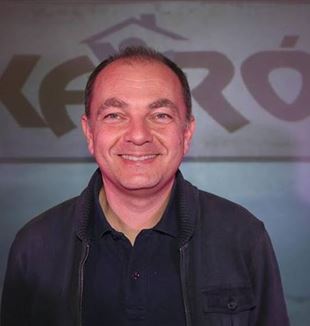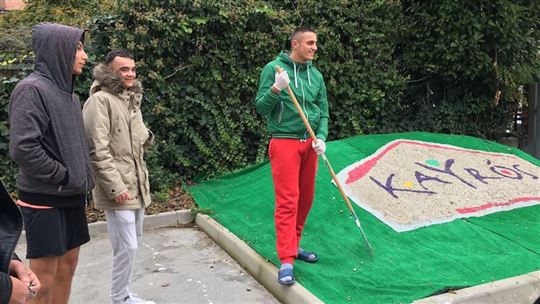
Fr. Claudio Burgio: "Everything will be for the good”
On the outskirts of Milan, fifty young people from the Kayrós community are living in "cloistered" isolation. What does this mean for them? "In front of certain questions, slogans are not enough," says the founder of the community."It will all be ok.” Try saying that to the fifty young people who live in the community, confined for weeks inside a rigid and endless enclosure that resists their vital impulses, who have complicated stories or who have been mistreated in their families. In fact, he, who knows them well and who has been living with them for weeks, never says this to them. Fr. Claudio Burgio, founder of the Kayrós Community and chaplain of the Beccaria juvenile prison in Milan, is wary of the slogans that have been going around in recent weeks. He considers them a superficial way of not wanting to face an uncomfortable reality and a way of attempting to manage the unpredictable under the illusion of having everything under control and coming out victorious. "Slogans are unable to withstand the disruptive impact of time," he says, "and they are a blunt weapon to help us face the fear that we are all experiencing.”
In these recent days of self-segregation because of Coronavirus, Fr. Claudio is putting the name and meaning of the community, founded twenty years ago, to the test. Many people regard the community as a valid educational model for everyone, not only for the “bad boys” who have fought against justice and society. Kairós in Greek means "propitious moment", "opportune moment": can one live such a desperate and painful situation as an opportune moment?
"The adolescents with whom I live night and day are usually considered "captive", not because of a congenital wickedness, but because they are imprisoned by the logic of power, violence and compulsive consumer instincts proposed-imposed by prevailing behavior patterns. And precisely because of the circumstances we are going through, many of their gazes, which have until now only be captured by needs that they consider indispensable, have now settled upon their deepest humanity, made up of great questions and desires."
It thus happens that, after a lunch with some guests of the community, one of them comes out with the question of all questions, a question that is often passed over because it is considered too cumbersome for those who wish to be victorious: why are there all these deaths? And why death? "The spectacularization of death is a fact that penetrates the existence of young people through video games and social media, but our whole culture has removed death from the public sphere, or hides it behind camouflaged language. Today, you do not die, but you disappear, you miss the affection of your loved ones, you move on to a better life... Many of the young people I live with play with death virtually, or attempt to challenge it by trying to overcome its limits, by using drugs or driving at a crazy speed whilst coming back from nightclubs. But, in recent days, when dialoguing with them about what is in front of their eyes, it has become evident that death is not a game over at the end of a game that you can restart by pushing a button. You realize - everyone, both young and old - how unprepared we are to die and how many gimmicks we need so we do not face our frailty. But those who recognize their own wounds learn to ask. And so, to my surprise, our dialogue has given rise to new questions: "God, where are you? If God exists, why does He not do anything to change this situation? What is the point of living?""
For many of them, thinking about God means thinking about Someone powerful, very powerful. What use is a weak God? And that man who died crucified, does that not declare his defeat before the world? "The young people of Muslim tradition - and we have many of them in the community - cannot conceive of a God who dies on the cross. For them, divinity is associated with the idea of domination, something powerful that determines the narrative of human events. For this reason, they are very provoked and challenged by Jesus who does not wield the sword, but who is meek and humble of heart, who sacrifices his life for the life of others. The young people of Christian tradition consider a God who contemplates weakness, and who seems helpless in the face of evil, as irrelevant. You begin to realize that the education received through their family or at catechism in their parish does not resist the scandal of pain.”
Read also - Angela Dematté: "The authenticity that I do not want to lose"
And he, the priest friend who has seen the drama and fall of these young people up close, how does he cope with their questions? "The first concern cannot be to fix things by revealing the correct and reassuring answer, because sometimes I do not even have it. It is important that they let themselves be provoked by what is happening and that they bring up questions that have long been censored or anesthetized, and that these questions remain open, not closed by slogans with a soft impact. And it is equally important that they accept to measure themselves against a God who exalts freedom, who does not decide for them. Faith thus becomes a challenge to be faced from a burning reality: it has to come to terms with experience. Even with the reality of sickness and death, because death also belongs to life. They need to see how an adult faces the possibility and meaning of pain and death. One cannot give lectures on these issues, one can only testify. We must tread this path together, because faith is a dynamic process and never a stationary possession. It is a risk, not a cradle. All this becomes a provocation both for me and for them, and together we live this pursuit that is never exhausted because, as the Spanish poet Antonio Machado writes, "paths are made by walking”. I told my boys who thirst for truth that perhaps "everything will not be ok” in this communal experience, but that everything will certainly contribute to Good, if we can give voice to our deepest questions and our relationship with God. Only thus will our kairós become an opportune moment."#Coronavirus